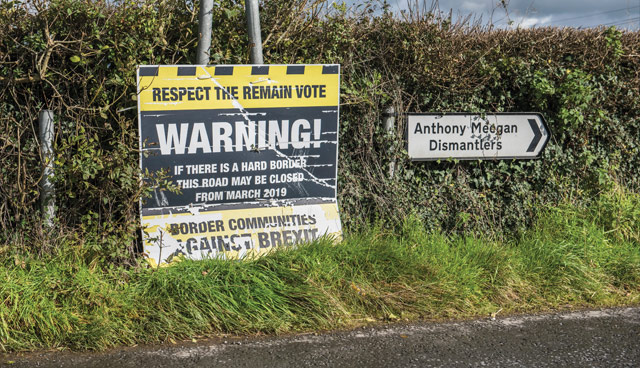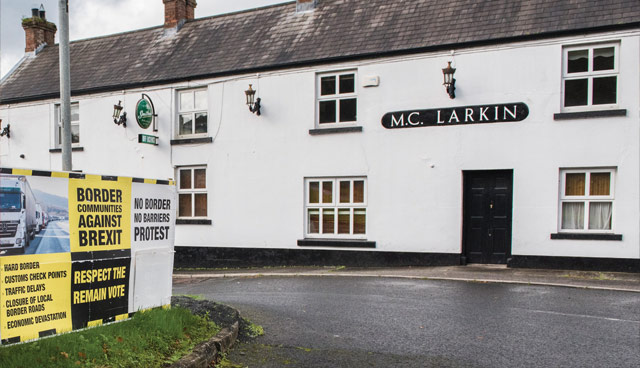Cross border trade is at the very heart of the Brexit conundrum

According to both the Irish Business and Employers Confederation (IBEC) and the Confederation of British Industry (CBI), any restrictions on either the free movement of goods, services, or people throughout the island of Ireland would have a detrimental impact on a vast number of businesses that have chosen to operate an all-island business model. A change to the current border arrangements would inevitably harm growth prospects for businesses and deter investment in both jurisdictions, writes Richard Halleron.
Hampering free movement would make it more difficult for companies to distribute goods and services and to recruit the right talent. It would also make the manufacturing of goods less efficient and possibly lead companies to make duplicative investments on both sides of the border. A distinct worry would be the imposition of customs or other checks that lead to delays.
This would cause major difficulties for integrated ‘just in time’ manufacturing processes, which rely on products and inputs arriving as they are needed. Firms have also expressed a fear of rising non-tariff barriers such as an increase in bureaucracy and administration costs that might be pushed back on to the firm — this is a particular worry for small companies along with the consequences of delays and disruptions to time sensitive production and supply chains.
IBEC also points to the economic interests of both the EU and the UK being best served by the UK remaining in a customs union with the EU. The organisation’s CEO Danny McCoy firmly believes that the UK must fully honour the commitment given by Westminster in phase one of the Brexit talks. This recognises the unique circumstances on the island of Ireland, which require unique solutions to protect the Good Friday Agreement and support continued north-south and east-west trade and business. In his opinion, a soft border with Northern Ireland post-Brexit is essential for this to be achieved.
McCoy says: “It is vital that the clear commitment given in the form of a UK government guarantee to avoid a hard border with Northern Ireland positively shape the final settlement. There can be no backtracking. This is important for exporters and importers, but also for companies investing across both jurisdictions. A final deal that delivers a close future relationship must be a shared goal. This must include regulatory alignment across all key sectors of the all-island economy and close cooperation into the future. Early agreement on how this can be achieved and a clear roadmap is crucial.”
He stressed that, in the absence of agreed solutions, full alignment is to be maintained with the rules of the Internal Market and the customs union that now and in the future support the all-island economy and so protect the Good Friday Agreement.
McCoy claims that “the idea that the UK leaving the EU customs union will deliver massive new trade opportunities is a fallacy. It will create major new administrative costs, disrupt trade flows and put jobs at risk. Irish business is resolutely opposed to new trade and customs barriers and the CBI, on behalf of British business, set out its support for a customs union this week. It is vital that the evidence-based concerns of business inform the approach of all parties to negotiations.
“Even if the UK stays in a customs union, without a commitment to the single market significant problems for business remain. Future EU-UK regulatory alignment is vital to avoiding a major disruption to trade and supply chains. The future relationship needs to be firmly based on the established, existing shared rules, which already support millions of jobs and communities across Europe. UK fortunes will be linked to those of the EU, even after Brexit. The closest possible future relationship is in all our interests.”
Irish Farmers’ Association (IFA) president Joe Healy has indicated that real solutions and compromise will be required in the Brexit negotiations to safeguard the vitally important cross-border agriculture trade on the island of Ireland.
Healy said this issue is of deep concern to farmers in the border region. Every year, thousands of animals and huge volumes of agricultural produce worth €2.2 billion move over and back across the border with Northern Ireland for further finishing or for processing, as part of a highly-integrated supply chain. These trading links have built up over many years and are critically important for farmers and processors on both sides of the border.

The IFA president says the UK’s insistence on leaving the customs union and pursuing an independent trade policy amount to a hard Brexit and would be very negative for Irish agriculture and the value of our agri-food exports. He says: “It is positive that the UK has put forward the principle that they wish to avoid a border in either the UK or Ireland for any purpose, including customs or agri-food checks. However, it is difficult to see how this could be achieved in practice, as cross-border trade in agricultural produce encompasses crucial issues such as food safety and animal health.
“If the UK insists on pursuing its own free trade agreements, two divergent regimes would have to operate on the island and it is impossible to see how border checks could be avoided. The UK will have to compromise on their future trade ambitions with third countries in the area of agricultural and food products.”
Healy makes it clear that Ireland is the EU economy that will be the most impacted by a hard Brexit. In this context, farming and agri-food will be the most impacted sector. “Ireland’s agri-food sector has a high dependence on the UK market, with 40 per cent of exports destined for the UK market annually,” he stresses.
“The option of a ‘customs partnership’ between the EU and UK is simply not an acceptable outcome for the agriculture and food sector, as even under this arrangement, the UK would still be committed to pursuing their own trade policy for imports into the UK.
“Any increase in low-cost food imports into the UK that would undermine the value of the UK market would have a devastating effect on the Irish agri-food sector. The potential displacement of Irish food exports from the UK market will in turn destabilise the EU market balance.”
In order to safeguard the future value of the Irish and EU farming and food sector, the IFA has confirmed that the EU must negotiate a balanced free trade agreement with the UK. This would include the following specific conditions for agriculture and food:
- tariff-free trade for agricultural products and food;
- the maintenance of equivalent standards on food safety, animal health, welfare and the environment; and
- the application of the Common External Tariff for agricultural and food imports to both the EU and UK.





